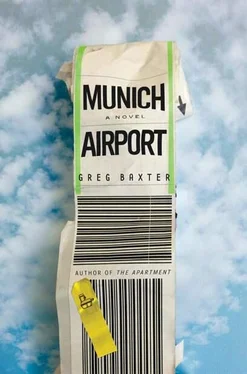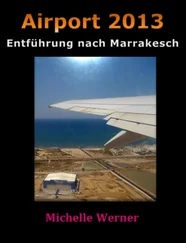Then he said, But, you know, I figure I’ll go the same way now. You will be away. Miriam is dead. Sometimes I look forward to it. Or at least I feel I deserve it.
He had opened a bottle of beer he’d brought with him from the apartment, and while he talked about his mother he drank. When he finished, he shook the bottle to see that it was empty. Then he placed the bottle in the plastic bag with our snacks. He took another bottle out and asked me if I wanted one. I said, I’m going over a hundred miles an hour. He said, That is a very good point. He opened the beer and had a sip and said, But let’s change the subject, let’s have a good time.
My grandmother’s family home in Mainz, the place where she was born, was destroyed in the war, and a basic, unadorned house was erected in the spot where her house once stood. We arrived there in late afternoon, and it was warm, warm even in the shade. On either side of the house were more houses like it. Across the street were thick woods. We parked directly opposite the door to the house — my grandmother’s old address. We’d been off the motorway for a while so I was drinking my first beer. My father walked up to the door and rang the bell. Then he stepped away from it and looked up, at the windows on the second floor. I stayed beside the car. I took some pictures with my phone. I waited. My father tried to ring the bells for both the neighboring houses, then he came back across the street and said, Nobody’s home. That’s a shame, I said. I might go for a little walk in the woods, he said, you want to come? I don’t think so, I said. So my father went alone on the path into the woods in which my grandmother probably played as a girl. I went down the road to a little convenience store — a tabak — and placed a bottle of water on the counter. The man behind the counter asked if that was it, and I said, No, give me a pack of those cigarettes. I quit smoking twenty years ago, when my mother died, but the man in the tabak didn’t know that, and I thought it was kind of funny, the way he just gave them to me, as though they meant nothing. I nearly felt I ought to say, I’m only going to smoke this one pack, maybe another. I bought a lighter as well, and as I walked up the street I smoked, and I felt light-headed. I got back to the car and stood there and watched my grandmother’s house. From the bottom of the street, from the direction of the tabak, a woman and a child came. The child was on a bike. The child was a girl. She looked four or five, I guess. The mother had dark-brown hair. She was wearing a blue dress. She saw me waiting, and I could see I made her nervous. I lit another cigarette. I tried to look nonchalant. I leaned against the car. I kept looking at her, because I assumed she couldn’t see my eyes through the sunglasses. I thought she would walk by. But she didn’t. She stopped at my grandmother’s house. I was standing right across the street from her front door. When she got to the door, and realized just how exactly, or precisely, I seemed to be standing in relation to her door, I could see that a part of her was panicking. For a moment, I felt slightly empowered by her panic. I could hardly believe it was happening, that I had become the reality of someone else’s nightmare. But I stopped short of trying to terrorize her. I smiled and waved and gave a very short and probably incomprehensible explanation of what I — we — were doing there. I did not stop to think that she had no idea who I meant by we . As I spoke I wondered if it were in fact possible that we were related, that if we could sit down and prove our identities, she would realize that we were cousins. She might let us in, let us walk through the house and out into the garden, which might be the same as it was when my grandmother lived there. Then I heard some rustling — my father — and the woman heard rustling. She hurriedly unlocked the door, threw her child in, and slammed the door behind her, and locked it. I heard my father’s voice from the woods. I threw my cigarette in the street and took the path into the woods and eventually spotted my father. He had wandered slightly off the trodden path, got himself stuck in some bushes, and couldn’t get out. I took his arm. You’ve been smoking? he said. He seemed a little shell-shocked. How long was I gone? he asked. We walked out to the street. I think you need to sit down, I said. He agreed. I opened the car door for him. I helped ease him into his seat. He patted my arm as he landed. Thank you, son, he said. I closed the door, looked back at the house, and saw a pair of eyes watching me. Then the eyes disappeared. When I went around to my side of the car and got in, my father said, Let’s get out of Mainz, let’s overnight somewhere else. So we drove. We didn’t have to go far. The first place we came to was a village called Walluf. How about Walluf? I said. I pronounced it VAHL-uff. It’s va-LOOF, said my father.
Really?
Really.
Well, I said, we gotta stop in Walluf.
Someone is calling my name. A man is shouting my name, shouting in various directions. I hear the shouting before I realize it’s my name that’s being shouted. I turn around. Trish is standing. There’s a man — a man I do not know, a young man — standing outside the men’s room, shouting my name. I start to walk toward him. As I begin to contemplate why a man would be shouting my name outside that bathroom, I start to jog. When I reach him, the man points inside. I walk around the blue-tiled dividing wall, and I stop. I take my sunglasses off and put them in my inner jacket pocket. I hear Trish behind me. I hear her shoes batter the hard floor as she runs. She does not wait outside. She comes in, right behind me, and asks what’s wrong. Could you wait outside, go guard our stuff? I ask. Is he okay? she asks. I’ve no idea, I say. Trish does not leave, does not go outside. She follows. I say, Is our stuff still by the seats? It’s fine, she says. The first room is full of sinks and hand dryers. The second room, past another dividing wall, has urinals on one side and stalls on the other. Everything is blue or gray. Dad? I call out. A few seconds pass. I am just about to call out again. Then I hear some movement. It is labored, or groggy, or both, like the sound of someone turning over in his sleep, in a sleeping bag at a bus station. Over here, he says. I turn to the source, or in its direction, and then I see it, between me and the stalls. He hadn’t made it in time, after all. I feel really rotten for him. I feel a huge sentimentalism rise up. It’s okay, Dad, I say, we’ll sort this out. He says nothing. I ask Trish to wait outside. Her head is down. Her arms are crossed. She does not leave. Then my father asks her to wait outside. She says, Okay, I’ll wait outside, I’ll watch the bags. She leaves. I wait a few moments. I say, Dad, you all right? He asks, Is Trish still here? She’s gone, I say. The stall doors go almost all the way to the floor. I cannot get down on my knees and look for his feet, and I can’t really hear where his voice is coming from. I ask him why it took so long for somebody to come get me. He says, I’ve been asking for help for fifteen minutes, I’ve asked half a dozen people. I knock on one door and somebody else answers. I knock on another door and nobody answers. I knock on another door and I hear my father say something. This you? I say. It’s me, he says.
Can you open the door?
It’s not locked.
Can I come in?
No.
Okay, what do you need?
Everything.
Jeans, underwear, socks, shoes?
Everything, he says.
Shirt, sweater?
Everything.
He moves again, and again it sounds like somebody in a bus station, moving on the floor. He sounds like he’s in trouble.
You okay otherwise? I ask.
He doesn’t answer, so I open the door. He is lying, mostly naked, but surprisingly clean, on the floor beside the toilet. Not completely on the floor, but half-fallen, holding on to the toilet roll dispenser with one arm and the commode with the other. But mostly in vain, since his legs and hips are already touching the ground. A man comes in and spots us. He immediately turns around and leaves. I enter the stall and close the door. My father tries to wave me away by moving his wrist. He makes an angry face. Get out of here, he says, just go get my goddamn clothes. I’m going to lift you up, I say, and then I’ll go get your clothes, you can’t be lying on the floor. He says, Don’t touch me. I say, Don’t be so fucking ungrateful. His eyes are bloodshot. He is breathing quick, shallow breaths. He is gathering the courage to speak. What he wants to say is in his mouth, he is trembling all over, he wants to say it so badly, yet he cannot allow himself. If he could say it — what is it, that he hates me, that I am a rat, that I killed Miriam, I am responsible? — he would be free to die with the dishonor he knows he deserves. I feel no sympathy for him. I hate him back. I grab him, lift him, and place him roughly on the commode. I push him back against the wall and raise my hand, and I think that I might, yes, now, strike him, a fist right to the eye, again, again, again, until his skull is so soft that my fist goes right through it, but he won’t lift his arms to defend himself, he does not try to escape. I let him away from the wall. I put my hand on his shoulder and pat him there a few times. It’s going to be okay, I say. I can’t feel my arms or legs, he says. I can’t feel anything. I wait. His head drops. I can see that he is exhausted. He spits over the other side of the commode. He is breathing shallow, painful breaths. Hold on, I say. I gather his clothes. I take all his belongings from his jeans pockets, and all his papers, and everything else, and put them in my pockets. I open the door to the stall and throw his soiled underwear and pants in a trash can, and his soiled socks, and his shoes. His shirt and sweater aren’t very dirty. I clean them up a little bit with soap and water, wherever they are soiled. There aren’t any paper towels, so I take my shoes and socks off, put my shoes back on, and make my socks soapy wet. I go back to the stall, push the door open, and, while he sits still, silently, I wash him. Then I dry him with toilet paper. Then I cover him up in his shirt and sweater. Then I say, Sit tight, Dad, I’ll get all new clothes. I’m going to get you something to eat, too. He lifts his head up. He says, I won’t eat. I say, You have to get on that plane.
Читать дальше











